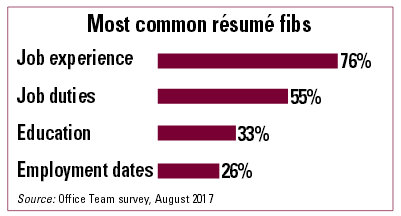With the sending of résumés as easy as a click of a button, job seekers today are pulling out all the stops to make themselves stand out. Sometimes that includes embellishing their résumés.
A full three-quarters of HR managers say they’ve caught a blatant lie on a résumé, according to a new CareerBuilder survey.
 Co-workers are noticing the trend, too. A poll by OfficeTeam found that almost half of U.S. workers (46%) said they know someone who included false information on a résumé. That’s a huge jump of 25 percentage points from a 2011 survey. Employees in the youngest age category (18-34) are most likely to know résumé fibbers.
Co-workers are noticing the trend, too. A poll by OfficeTeam found that almost half of U.S. workers (46%) said they know someone who included false information on a résumé. That’s a huge jump of 25 percentage points from a 2011 survey. Employees in the youngest age category (18-34) are most likely to know résumé fibbers.
One reason applicants lie is that they know HR won’t spend much time reviewing their résumé. In fact, 39% of HR professionals say they spend less than a minute looking at each résumé, and 19% spend less than 30 seconds.
With embellishments on the rise, employers need to take a buyer beware attitude with résumés. Even worse, the internet is full of “diploma mills” that hand out degrees for little or no work.
Advice: Don’t shrug off minor résumé exaggerations; they tell a lot about character and effort level. Also, don’t probe more deeply into the background of any particular group (females, minorities, etc.) or you’ll risk a lawsuit.
Put applicants on notice that you will verify information they provide and terminate them if they lie on the application, résumé or during the interview. If you have workers fill out applications, make that clear up front with a statement like this:
The facts set forth in my application and résumé are true and complete. I understand that, if employed, false statements will be considered sufficient cause for dismissal. I hereby authorize [company name] or its agents to make an investigation of my employment and personal history through any investigative or credit agencies of its choice.
Here are seven other ways to poke holes in an applicant’s claims:
1. Check for inconsistencies. Résumé-writing software can make anyone look good. Look for slip-ups in dates (such as overlapping start and stop dates) and contradictions between job titles and duties. Ask about time gaps.
2. Require all interviewees to fill out applications. Then look for inconsistencies between the résumé and the handwritten application.
3. Test skills. If an applicant claims proficiency in a computer program or a certain machine, check those skills.
4. Check references, then ask for more. Demand that applicants provide phone numbers for all past employers, and make sure you call. And ask for names of former supervisors, key vendors, etc. Call the college admissions office to verify degrees.
5. Don’t confuse referrals with references. Perform the same thorough check on candidates referred by co-workers or friends that you would on candidates from other sources.
6. Probe claims of supervisory duties. If a résumé says the person managed or supervised others, ask, “When you say ‘supervise,’ who did you manage and what did your duties involve? Did you assign work, evaluate employees and conduct performance reviews?” A true manager would have done that, and more.
7. Question claims of saving the company money or resources. Often, the claims are true, but they may be exaggerations. Follow up with questions such as, “How, exactly, were those savings realized?” Also, follow up on any claim that follow the words “reorganized” or “restructured.” Why? “Reorganizing” the department may mean the person merely reorganized the files.
Online resource: Résumé scorecard
To download a free Résumé Scorecard that allows you to tally résumé quality under 14 various topics, including experience and education, go to www.thehrspecialist.com/scorecard.
[icegram unknown-campaigns=”48301″ known-campaigns=”48199″]5 most outrageous gaffes
A new CareerBuilder survey asked HR professionals to share the most cringe-worthy real-life résumé blunders they’ve spotted. The “winners”…
1. Applicant claimed to have written computer code that was actually written by the hiring manager.
2. Applicant said he worked for Microsoft but had no idea who Bill Gates was.
3. Applicant’s résumé was lifted from the internet, but it didn’t match the cover letter.
4. Applicant included with his résumé a picture with all his pets.
5. Applicant claimed to be an anti-terrorist spy for the CIA at the same period he was in elementary school.



